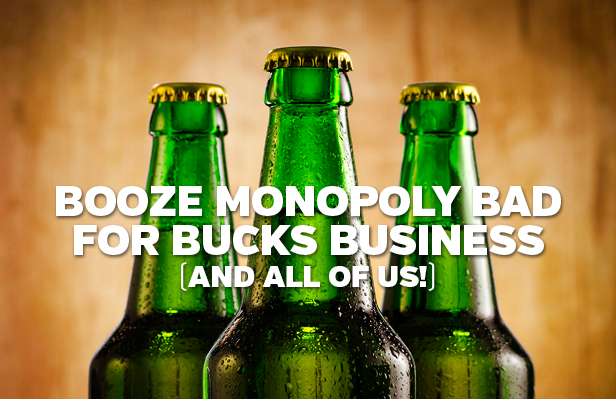Commentary

Booze Monopoly Bad for Business
Note: This commentary first appeared in The (Bucks County) Intelligencer.
Whether he’s pouring drinks or excavating ruins beneath his historical tavern in Bucks County, Frank Lyons loves his customers and his community. This winter, a snow storm knocked the power out at the Continental Tavern, but Frank used a generator to keep his doors open and his customers in good spirits.
The crowded tavern became so busy that Frank needed to restock, but when he went to the closest government-run liquor store, he found it closed.
Frank could have traveled a mere six minutes to New Jersey to pick up a few bottles, but it is illegal to purchase alcohol out of state and bring it back to Pennsylvania. Frank decided to make do with what he had, even though the decision could have hurt his business.
Pennsylvania’s liquor system is stuck in the Prohibition Era, penalizing business owners like Frank. These outdated, harmful restrictions stand in the way of business owners serving their customers.
Recent revelations that the state officials regulating Frank’s business violated their own ethical codes add insult to Frank’s injury. Corruption at the highest levels of the PLCB bolsters the already overwhelming case for getting government out of the booze business.
According to the state Ethics Commission, three former liquor officials violated ethics laws by accepting gifts from PLCB vendors. They failed to disclose those gifts and even used employment at the PLCB for their personal benefit. In one case, James Short, the former director of marketing, was reimbursed by taxpayers to play in a golf outing unrelated to his work.
Unfortunately, this type of corruption is a symptom of a much larger problem: The government’s complete control of the sale and distribution of wine and spirits in Pennsylvania. If government bureaucrats did not have the sole authority to determine what alcohol is sold in all the state’s liquor stores, businesses would have no incentive to bribe them with golf outings, fancy dinners, and free liquor.
The PLCB’s abuse of power isn’t the only problem. The agency fails to serve consumers and entrepreneurs effectively.
Forty-five percent of residents in Philadelphia and the surrounding counties say they purchase alcohol in other states. This border bleed costs Pennsylvania millions in lost sales and lost tax revenue. With so many residents illegally crossing state lines to buy wine and spirits, shouldn’t PLCB officials realize they are not meeting consumers’ needs?
Voters in the state of Washington recently realized the flaws of a government liquor monopoly. After the state privatized its liquor stores, it realized an increase in sales and saw a net increase in employment.
This experience follows a historical pattern. Alberta, Canada privatized its liquor system decades ago. Since then, the province has seen an increase in liquor retail employment according to Mark Milke of the Fraser Institute.
More jobs wouldn’t be the only benefit. Right now, Pennsylvania has approximately 600 state stores serving 12.7 million people. As entrepreneurs like Frank Lyons can attest, consumers aren’t the only group underserved by the PLCB.
Frank would welcome the chance to patronize a liquor store that stays open when he needs it most. Or even one that offers delivery directly to his tavern. As it stands, his choices are limited to a monopoly whose stores are closed on eleven state holidays.
Two years ago, Frank found a cache of bottles in a hidden chamber under his more than 200-year-old tavern. They were likely stashed there in the Prohibition Era–back when following the law meant having no choice at all.
Today, lawmakers have the chance to finally complete the rollback of Prohibition and end the cycle of corruption at the PLCB by giving Pennsylvanians what they overwhelming support: The freedom to choose!
# # #
Bob Dick is a policy analyst for the Commonwealth Foundation (CommonwealthFoundation.org), Pennsylvania’s free market think tank.